Thousands defy Kremlin to attend Alexei Navalny’s funeral
Security forces and the opposition leader’s supporters are on edge in Moscow as anger at Vladimir Putin grows.
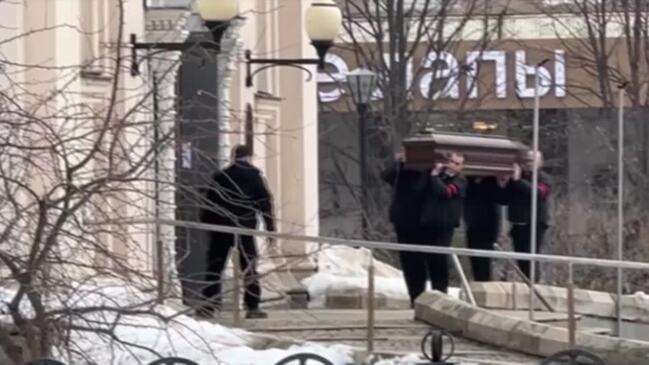
Thousands of people defied the threat of arrest by attending the funeral of Alexei Navalny in Moscow, embracing one of the last remaining avenues to register their anger at President Vladimir Putin as well as mourning one of the few politicians capable of standing up to the Russian leader.
The Kremlin had warned Russians against attending what it called spontaneous memorials for the opposition leader, who died in an Arctic prison camp last month. But security forces largely took a hands-off approach to the procession of mourners that made its way from the Church of the Icon of the Mother of God to the cemetery where Navalny was laid to rest. His parents looked on as people placed dirt on his coffin.
Some in the crowd shouted, “No to war.” Others joined in with calls of “Putin is a murderer” and “Free political prisoners.” Concern remains high that people who turned out to pay their respects could face reprisals after the presidential election later this month. Putin is expected to easily win that poll, and his challengers are carefully vetted. Analysts said the Kremlin sees a strong showing in the election as a way to legitimatize his rule as the war in Ukraine moves into its third year. With the vote coming, it couldn’t risk disrupting Navalny’s Orthodox Christian burial, analysts said.
“The Kremlin is trying to avoid heat ahead of the coming elections, it’s going to be socially disapproved if they are brutal,” said Abbas Gallyamov, a political analyst and a former Putin speechwriter. “This is a funeral and if the Kremlin starts acting like it’s a political event, it would turn it into one.”
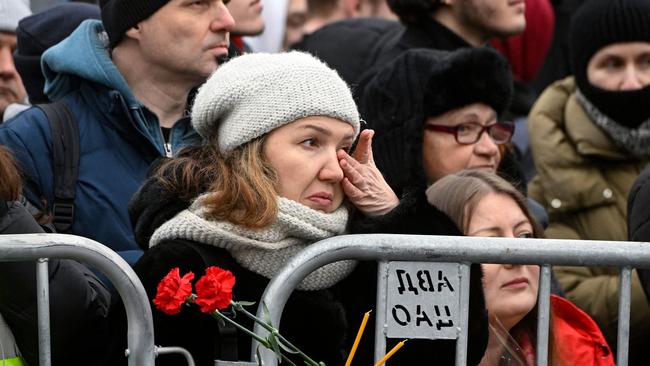
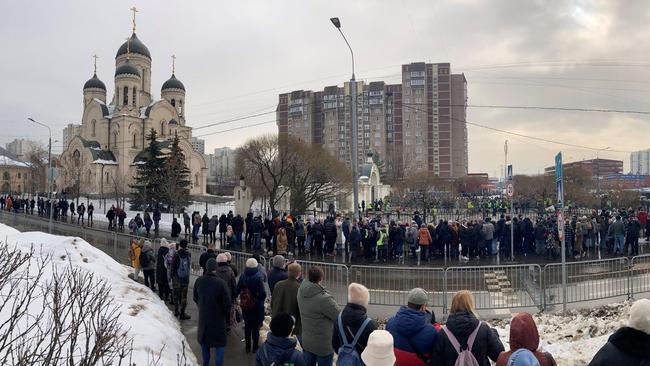
The city was on edge in the hours before the service. Russian independent media reported heavy police presence Friday morning around the church and cemetery. Heightened security was also evident around some public buildings and metro stations, residents said.
By noon, crowds had begun to gather at the church where the service was to be held. Fences had been erected outside to control the crowds. Long lines of people waited to pay their respects, many carrying flowers.
The crowd erupted in applause and cries of “Navalny, Navalny” as the hearse carrying his coffin entered the church compound.
“You were not afraid and we are not afraid,” they chanted, as mourners, mostly Navalny’s relatives, were gradually allowed to enter the church.
Navalny’s widow, Yulia Navalnaya, earlier this week warned in a speech to the European Parliament in Strasbourg that Russia’s security forces could use the funeral as an opportunity to round up more of his supporters. Navalnaya also told European lawmakers that Putin had killed her husband, an allegation the Kremlin has denied.
“On his orders, Alexei was tortured for three years: He was starved to death in a tiny stone cell, cut off from the outside world, and denied visits, phone calls and even letters,” she said. “Even after that they abused his body and abused his mother,” she added, without providing evidence.
Navalnaya didn’t attend the funeral, but posted a message to Instagram concluding with, “Love you forever. Rest in peace.” Their daughter, Dasha, thanked her father for teaching her to “live by principles. Live with dignity,” she wrote on Instagram. “I promise you that I will live my life the way you taught me, to make you proud,” she said.
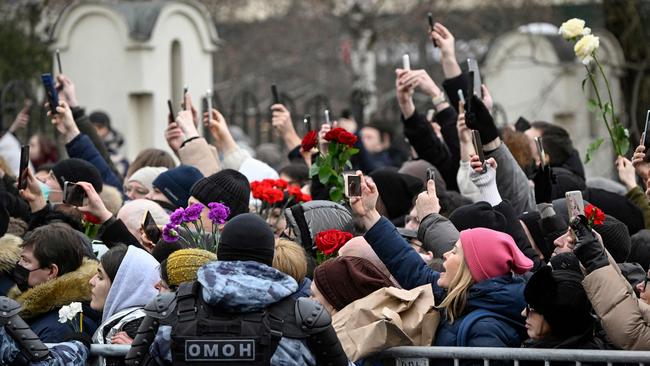
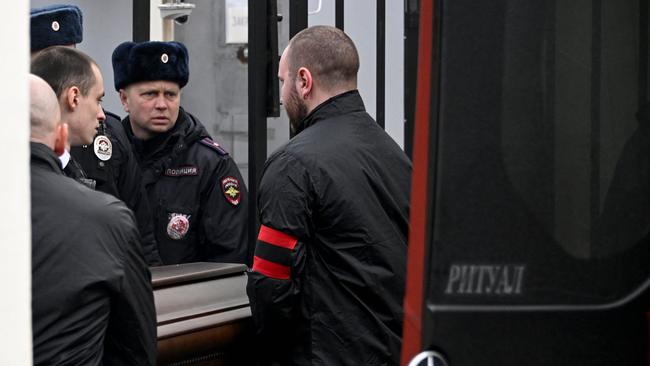
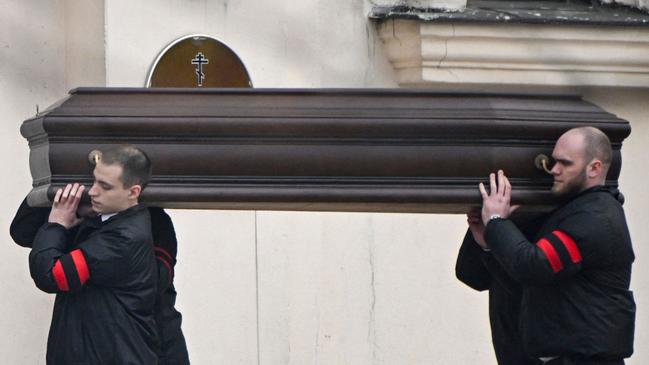
The risk of attending the funeral was real. At least 400 people were arrested across Russia for laying flowers in memory of Navalny after news of his death emerged on Feb. 16, according to OVD-Info, a Russian rights-monitoring organisation.
That so many people turned out to pay their final respects reflected Navalny’s reach and influence. Though he had long dabbled in opposition politics, he primarily rose to fame through a series of YouTube investigations exposing the wealth of Putin’s inner circle. His media skills set him apart from other figures in Russia’s fragmented opposition and gave him a nationwide following that made him especially dangerous to Putin, whom he once called “a naked, thieving emperor.”
In 2020, Navalny survived a poisoning attempt while returning from a campaign trip to eastern Russia. He nearly died and was evacuated to Germany for treatment after his wife made a public appeal to Putin. He returned to Russia in January 2021 and was detained on arrival at Moscow’s Sheremetyevo airport, and later sentenced to 30 years in prison on various charges.
Presidential spokesman Dmitry Peskov told reporters Friday that the Kremlin had no comment on Navalny’s funeral, but he warned of the consequences of participating in any unsanctioned gathering, state news agency TASS reported.
“We have a reminder that there is a law [and] it must be followed,” Peskov said. “Any unauthorised gatherings will violate the law. Accordingly, those who participate in them will be held accountable.” Last week, Navalny’s mother, Lyudmila Navalnaya, released a video saying Russian authorities demanded that he be buried in secret and alleging that authorities attempted to blackmail her and threatened they would “do something with my son’s body.” Russia’s Investigative Committee, the country’s main investigative authority, didn’t respond to a request for comment on Lyudmila Navalnaya’s claims. Prison authorities reported that Navalny collapsed after a walk at his prison camp, lost consciousness and couldn’t be revived. Russian state media has largely remained silent on Navalny’s death and why he was serving prison time.
After Navalny’s team struggled for days to find a venue that would agree to host his memorial service, his allies said on Thursday that no mortuary had agreed to send a hearse to bring his body to the church for the funeral service. The businesses had reportedly received calls from unknown people threatening them not to transport Navalny’s body anywhere, according to Navalny’s spokeswoman, Kira Yarmysh.
The funeral was held in an area where Navalny once lived. Among those attending were the US ambassador to Moscow, Lynne Tracy, who carried flowers. Other senior Western diplomats were also present.
The US Embassy in Moscow said on its X account that Navalny’s fate “is a tragic reminder of the lengths the Kremlin will go to silence its critics.” Navalny’s death has further frayed relations between Russia and the West, already strained to the breaking point over Putin’s invasion of Ukraine two years ago. President Biden placed the blame squarely on Putin, while other members of the Group of Seven advanced economies also laid the blame with the Russian president and demanded that Moscow provide an explanation. This week, the European Parliament adopted a resolution saying that full responsibility for Navalny’s death lies with the Russian state and Putin in particular should be held accountable.
On Friday, the British foreign minister, the German chancellor and the European Union’s top foreign policy official were among the many who paid tribute to what they described as Navalny’s spirit of defiance.
Russia has dismissed such statements as an attempt to interfere in its internal affairs, but Navalny’s death has also inflamed criticism within Russia.
Boris Nadezhdin and Yekaterina Duntsova, two lesser-known politicians who, like Navalny, oppose the war in Ukraine and were barred from getting on the ballot in this month’s election, were among those who attended the funeral.
“Today, of course, on the one hand, is a tragic day. We are saying goodbye to a man who became a symbol of the era,” Nadezhdin said in a video posted online. “But on the other hand, there is hope that everything will be fine in the end and Russia will become strong and free as Alexei dreamed.” Duntsova praised Navalny for taking difficult decisions if he thought they were the right thing to do. “Not everyone is capable of this,” she wrote on her Telegram channel and posted a photo near the crowds at the church.
Yarmysh said Navalny’s team had initially struggled to find a place to hold the memorial service. He was buried nearby in the Borisov Cemetery. His associates published a diagram on social media with instructions on how to get from the church to the cemetery.
Some of the scenes at the church were livestreamed on Navalny’s YouTube channel, while his supporters were urged to lay flowers at memorials in honour of the opposition leader at 7pm local time.
Video posted on social media showed mourners embracing Navalny’s parents, Lyudmila and Anatoly, as they left the church, some saying, “Thank you for your son.” Most of the thousands who gathered at the church to bid farewell to Navalny were prevented from viewing his body. Some people cried and begged for his coffin not to be closed.
Despite stringent laws forbidding criticism of the Kremlin’s war in Ukraine, security forces in Moscow largely held back. OVD-Info, the Russian rights-monitoring group, reported that 56 people were detained across the country in 14 cities in connection with Navalny’s funeral, including in the Urals city of Yekaterinburg, where 10 people were taken into custody while laying flowers, and in Novosibirsk in Siberia, where authorities detained seven people at a rally in memory of Navalny.
Some of those detained were quickly released, according to information from OVD-Info.
Navalny’s allies have announced a reward of 100,000 euros, equivalent to $108,000, for information that could shed light on Navalny’s death and urged members of the security forces to come forward, saying they would help any informants leave the country.
Navalny’s widow, who has vowed to continue his work, has promised to lead her own investigation into his death.
“Putin must answer for what he has done to my country,” she told European lawmakers. “Putin must answer for what he has done to a neighbouring, peaceful country. And Putin must answer for everything he has done to Alexei.”
The Wall Street Journal

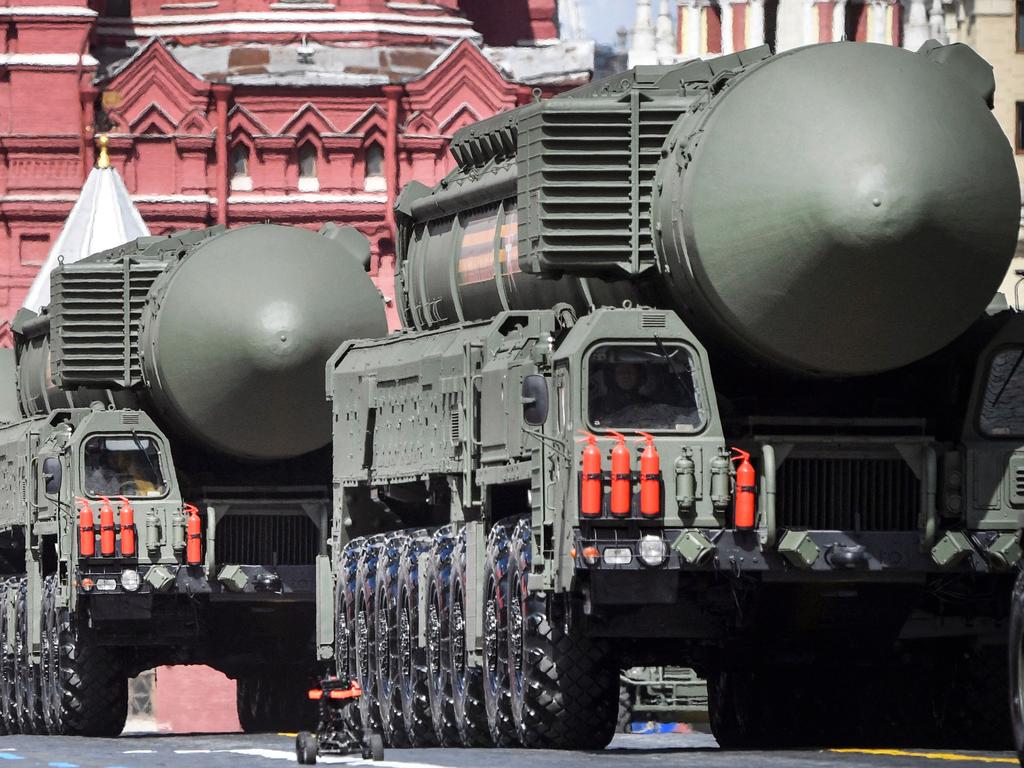
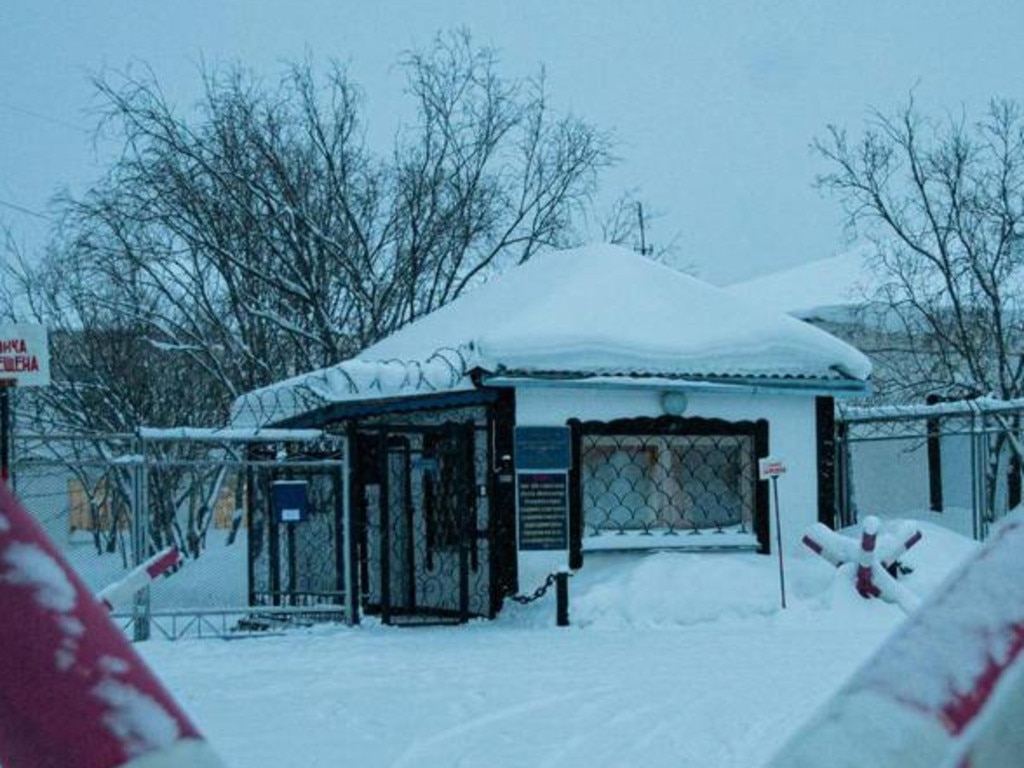
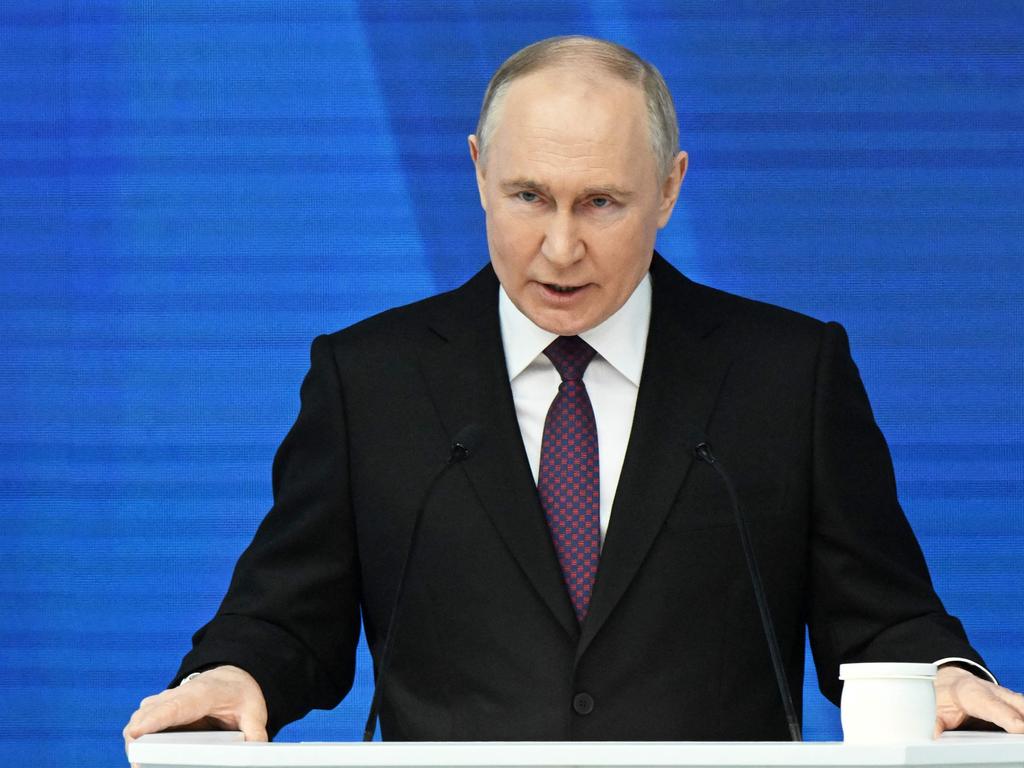
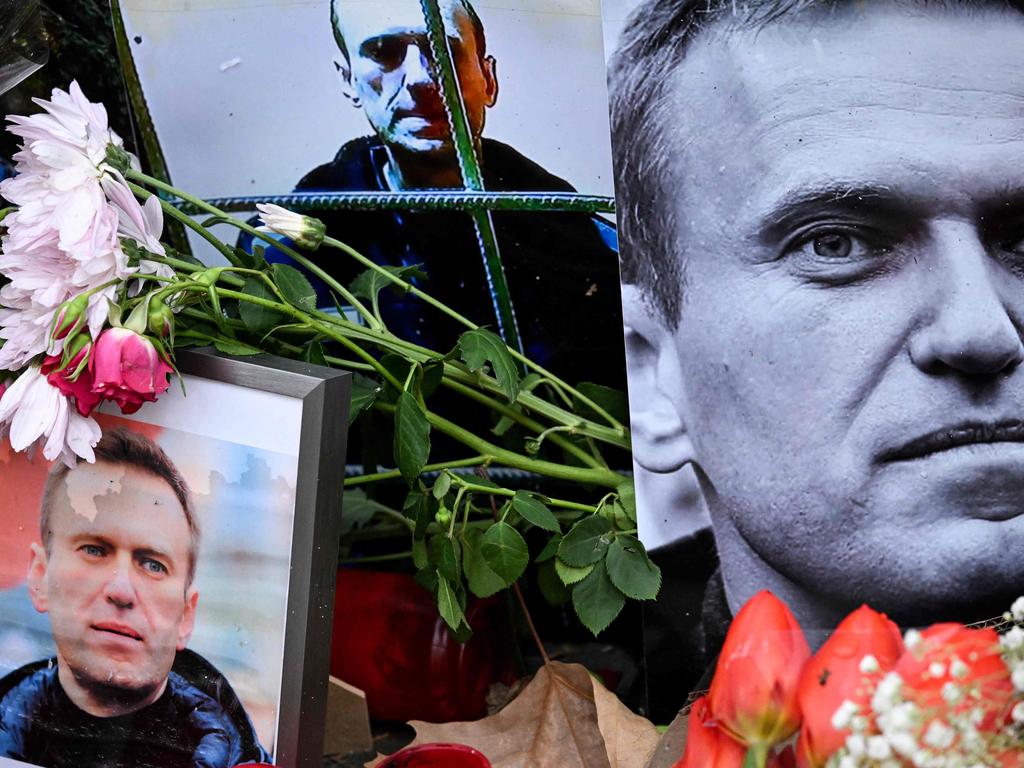


To join the conversation, please log in. Don't have an account? Register
Join the conversation, you are commenting as Logout